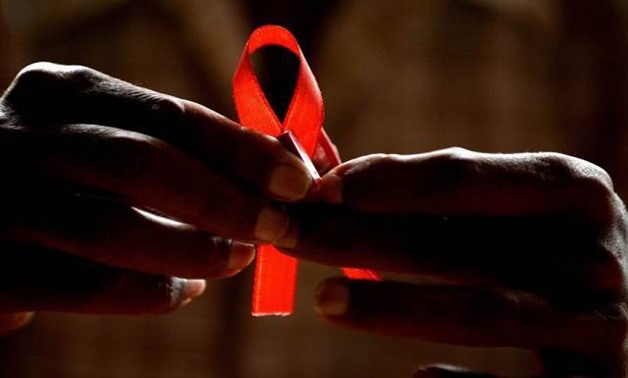
A man holds a red ribbon to mark World Aids Day, at the entrance of Emilio Ribas Hospital, in Sao Paulo Dec. 1, 2014 – Reuters
CAIRO – 5 September 2018: Egyptian Minister of Health announced Tuesday a national plan to eliminate the Human Immunodeficiency Virus (HIV/AIDS) in Egypt by 2030. The plan is considered a part of a bigger international plan to end AIDS by 2030.
- AIDS (aka stage 3 HIV) is a condition that may be developed when the HIV virus manages to cause serious damages to the immunity system.
The ministry revealed that the Acquired Immune Deficiency Syndrome (AIDS) infection rate in Egypt has decreased to less than 0.02 percent this year, to represent one of the lowest infection rates worldwide, according to official statements issued by the World Health Organization (WHO) and the UNAIDS.
Khaled Megahed, the Health Ministry’s spokesman, said that the ministry has created several strategic plans that aim to decrease the infection rate and totally end infection with AIDS by 2030.
As part of the plans, Megahed said that the ministry will provide medical examination opportunities for those who faced infection risk, and supply infected people with antiretroviral drugs. From a social perspective, Megahed said that the ministry is strengthening its awareness efforts to prevent behaviors that can lead to the infection with HIV.
For his part, Alaa Eid, head of Preventive Medicine Sector at the Ministry of Health and Population, said that antiretroviral drugs for HIV have been provided through 15 specialized centers to 100 percent of the recorded HIV patients, affirming that such treatment are provided for free.
Eid said that the Preventive Medicine Sector has issued a number of publications that urge health institutions to introduce all medical services required for people infected with HIV, while maintaining the confidentiality of patients’ records and ensuring equality between HIV patients and other patients.
AIDS versus HIV
AIDS and HIV should not be confused. AIDS (aka stage 3 HIV) is a condition that may be developed when the HIV virus manages to cause serious damages to the immunity system. HIV patients can live a normal life span thanks to HIV developed medications.
Patients contracting AIDS are more subject to be infected with diseases including certain cancers, as it is hard at this point for their immunity system to be repaired. Subsequently, life expectancy is severely affected.
Men are less likely to test for HIV or access antiretroviral therapy and, therefore, are more likely to die of AIDS-related illnesses than women, UNAIDS said on Friday.
Around the world, fewer than half of HIV-positive men are getting treatment, compared to 60 percent of women, according to a UNAIDS report released on World AIDS Day.
Men are also more likely than women to start treatment late, interrupt it, and not follow up after treatment.
About 36.7 million people in the world were living with HIV in 2016, but fewer than 21 million people had access to antiretroviral, according to UNAIDS.
CAIRO – 21 July 2018: Amongst the health reforms that were initiated by President Abdel Fatah al-Sisi was the national strategy to cure Hepatitis C and help combat its spread.
AFP contributed to the report

Comments
Leave a Comment